|
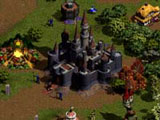 The
last few months have seen a spate of real-time strategy games, mostly
add-ons to established titles (Firestorm, Iron Plague) or clones that
follow the tried-and-true C&C/AoE/Starcraft model. We all know the
classic RTS drill--hammer together some buildings, crank out some troops,
pump ‘em up with some upgrades, select ‘em all and send that churning
wave of funky death steamrolling right into your enemy’s base. And sure
it’s fun, but it’s also getting a more than a bit predictable.
That’s why Microprose and Hasbro’s Majesty is such a nice change of
pace. The
last few months have seen a spate of real-time strategy games, mostly
add-ons to established titles (Firestorm, Iron Plague) or clones that
follow the tried-and-true C&C/AoE/Starcraft model. We all know the
classic RTS drill--hammer together some buildings, crank out some troops,
pump ‘em up with some upgrades, select ‘em all and send that churning
wave of funky death steamrolling right into your enemy’s base. And sure
it’s fun, but it’s also getting a more than a bit predictable.
That’s why Microprose and Hasbro’s Majesty is such a nice change of
pace.
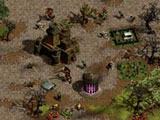 Majesty
looks a lot like other fantasy RTS games—you get your standard ¾
overhead view and 2D graphics—but it plays a whole lot different.
The biggest difference between Majesty and you standard RTS clone is that
you don’t directly control your troops. In Majesty, you can’t just
drag-select a group of elven archers, click on an enemy building, and
expect them to march posthaste to the target. In fact, you don’t give
your troops any direct orders at all. Rather you influence them—mostly
by offering them money to attack certain targets. While this might sound
like a pretty reductive model of kingdom management, and those who love
micromanaging might cringe, Majesty will actually keep you plenty busy,
and its gameplay has more depth than you might expect. Majesty
looks a lot like other fantasy RTS games—you get your standard ¾
overhead view and 2D graphics—but it plays a whole lot different.
The biggest difference between Majesty and you standard RTS clone is that
you don’t directly control your troops. In Majesty, you can’t just
drag-select a group of elven archers, click on an enemy building, and
expect them to march posthaste to the target. In fact, you don’t give
your troops any direct orders at all. Rather you influence them—mostly
by offering them money to attack certain targets. While this might sound
like a pretty reductive model of kingdom management, and those who love
micromanaging might cringe, Majesty will actually keep you plenty busy,
and its gameplay has more depth than you might expect.
Majesty is set in the
fantasy kingdom of Ardania. It’s a fairly standard fantasy world. You
play the good guy, and your troops will be made up of the usual suspects.
In most games, you’ll be able to build guild structures that will
produce rangers, warriors, and rogues almost immediately. As the game
progresses, you’ll begin to erect temples and special buildings that
allow you to turn out such heroes as wizards, elves, monks, cultists,
dwarves, elves, and barbarians. Some of the more advanced units will be
able to cast a nifty assortment of spells, and as they gain experience and
you upgrade buildings their spells and attacks will increase in variety
and power. The nasties that populate Ardania are also nicely
varied—there are over 30 different evil troop types, including
everything from minotaurs to skeletons to the terrible rock golem.
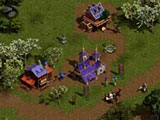 Since
you have no real control of the troops you enlist to your cause, most of
your time will be spent managing your palace and its surrounding
structures. Your kingdom will have a wide variety of buildings (though
not all are available in every scenario). Some, like temples or guilds,
will give you troops. Others, like guard towers and ballista towers, will
provide defense against swarms of enemy troops.
Blacksmiths allow you to upgrade weapons, marketplaces and trading
posts will boost your income, and inns will offer your heroes a safe haven
when they’re far from home. It’s fascinating to watch your charges go
about killing monsters, spending their money on new weapons and spells,
and training at the fairgrounds—even more so because you don’t have
any real say in what they do. You’re
not entirely locked out of the game, though--most of the temples and the
Wizard’s tower allow you the power to cast “sovereign
spells”—spells cast by you rather than your heroes. And some buildings
are less useful and edifying. For instance, once you build an elven
bungalow, which allows you to recruit decadent elves, you’ll also see
gambling halls and lounges begin to spring up. These dens of iniquity will
deter your more weak-willed heroes from carrying out orders. Since
you have no real control of the troops you enlist to your cause, most of
your time will be spent managing your palace and its surrounding
structures. Your kingdom will have a wide variety of buildings (though
not all are available in every scenario). Some, like temples or guilds,
will give you troops. Others, like guard towers and ballista towers, will
provide defense against swarms of enemy troops.
Blacksmiths allow you to upgrade weapons, marketplaces and trading
posts will boost your income, and inns will offer your heroes a safe haven
when they’re far from home. It’s fascinating to watch your charges go
about killing monsters, spending their money on new weapons and spells,
and training at the fairgrounds—even more so because you don’t have
any real say in what they do. You’re
not entirely locked out of the game, though--most of the temples and the
Wizard’s tower allow you the power to cast “sovereign
spells”—spells cast by you rather than your heroes. And some buildings
are less useful and edifying. For instance, once you build an elven
bungalow, which allows you to recruit decadent elves, you’ll also see
gambling halls and lounges begin to spring up. These dens of iniquity will
deter your more weak-willed heroes from carrying out orders.
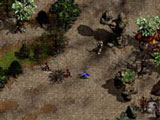 Gameplay
mostly revolves around making wise selections about what and when to build
and where to attack while carefully managing your money.
Gold is pretty scarce in Ardania, and most of it accrues from
taxes. Your tax collector will make the rounds of each of your buildings
and bring home the bacon. He’s extremely vulnerable to enemy attacks, so
you have to keep an eye out for him.
There’s never enough money. You can choose to buy bunches of
melee troops or supercharge your magic users, but it’s the rare scenario
that allows you the resources and/or time to do both. Once you’ve
purchased your troops and buildings and upgraded them, you can begin to
attack your enemies. Most of the game’s scenarios involve seeking out
enemy lairs (and eventually their main base) and destroying them.
Since you can’t just send your troops out to attack these places
or the monsters that guard them, you have to rely on the less-than-subtle
motivation of bribery. In Majesty, you get your units to attack where you
want buy placing either reward or explore flags. It costs you money to
place these flags, and the more you spend, the more likely that your
heroes will attack. Gameplay
mostly revolves around making wise selections about what and when to build
and where to attack while carefully managing your money.
Gold is pretty scarce in Ardania, and most of it accrues from
taxes. Your tax collector will make the rounds of each of your buildings
and bring home the bacon. He’s extremely vulnerable to enemy attacks, so
you have to keep an eye out for him.
There’s never enough money. You can choose to buy bunches of
melee troops or supercharge your magic users, but it’s the rare scenario
that allows you the resources and/or time to do both. Once you’ve
purchased your troops and buildings and upgraded them, you can begin to
attack your enemies. Most of the game’s scenarios involve seeking out
enemy lairs (and eventually their main base) and destroying them.
Since you can’t just send your troops out to attack these places
or the monsters that guard them, you have to rely on the less-than-subtle
motivation of bribery. In Majesty, you get your units to attack where you
want buy placing either reward or explore flags. It costs you money to
place these flags, and the more you spend, the more likely that your
heroes will attack.
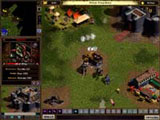 Of
course, your heroes will never do exactly what you want them to. Some will
decide to get loaded in the gambling hall, some will think money crass and
ignore rewards, some will flee in terror from less-than-terrible monsters.
If you’re the type who likes to control every movement of your troops,
this might drive you nuts and you may not want to play this game. You
might also want to think very carefully about ever having kids. But if you
can get used to the more subtle methods that Majesty demands, you’ll
soon find yourself fascinated by the game’s depth and your troops’
actions. It took me a while to warm to Majesty, but once I unlearned some
old RTS habits I found it utterly addictive. Of
course, your heroes will never do exactly what you want them to. Some will
decide to get loaded in the gambling hall, some will think money crass and
ignore rewards, some will flee in terror from less-than-terrible monsters.
If you’re the type who likes to control every movement of your troops,
this might drive you nuts and you may not want to play this game. You
might also want to think very carefully about ever having kids. But if you
can get used to the more subtle methods that Majesty demands, you’ll
soon find yourself fascinated by the game’s depth and your troops’
actions. It took me a while to warm to Majesty, but once I unlearned some
old RTS habits I found it utterly addictive.
Majesty also looks
awfully good. Don’t expect any whiz-bang 3D stuff, but the graphics are
extremely polished and striking. Spell effects are especially cool, and
the sound and voice acting is superb. It’s clear that Microprose and
Cyberlore put a lot of effort into the game, and it shows in the attention
paid to small graphic and audio details. The game’s manual is also
excellent and attractive.
Though we haven’t
had the opportunity to play online, Majesty includes about every
multiplayer option you could ask for, including modem, LAN, and internet
play on the Zone.
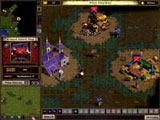 For
all of Majesty’s strengths, it does have some problems that keep it out
of five-star territory. First, Majesty’s campaign game is pretty weak.
You can play any of the scenarios in any order, and while the early
beginner scenarios do a great job of teaching the game’s concepts in
easily digestible bites, the advanced and expert scenarios lack any kind
of coherent narrative. It’s just one damn thing after the other, and
there’s no real sense of closure or accomplishment when you complete the
game. Which doesn’t take long, by the way.
The campaign game is pretty short—you can finish it in a couple
of long days of gaming. This isn’t all that horrible, especially since
Majesty includes a great scenario generator for Freestyle games, but still
. . . . And frankly, the game’s scenarios could have used a little more
variation. Too many of them are of the kill ‘em all variety, and the
ones that aren’t usually consist of trying to make a bundle of money in
a short amount of time. For
all of Majesty’s strengths, it does have some problems that keep it out
of five-star territory. First, Majesty’s campaign game is pretty weak.
You can play any of the scenarios in any order, and while the early
beginner scenarios do a great job of teaching the game’s concepts in
easily digestible bites, the advanced and expert scenarios lack any kind
of coherent narrative. It’s just one damn thing after the other, and
there’s no real sense of closure or accomplishment when you complete the
game. Which doesn’t take long, by the way.
The campaign game is pretty short—you can finish it in a couple
of long days of gaming. This isn’t all that horrible, especially since
Majesty includes a great scenario generator for Freestyle games, but still
. . . . And frankly, the game’s scenarios could have used a little more
variation. Too many of them are of the kill ‘em all variety, and the
ones that aren’t usually consist of trying to make a bundle of money in
a short amount of time.
But overall, Majesty
is a vastly entertaining game. It may take hidebound RTS’ers a while to
get use to it, but once they do they’ll find themselves wishing, as I
did, that the campaign game had just one (or ten) more scenario(s) in it.
--Rick
Fehrenbacher |
